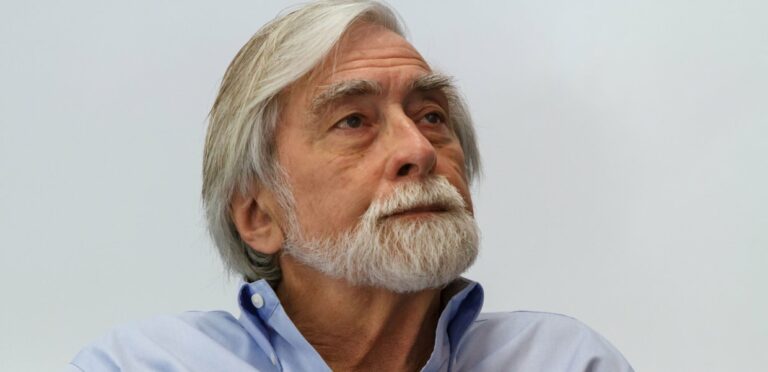This interview was originally published on October 10, 2014. Dr. Kumar tells Paul Jay that what Bill Maher said is a perfect example of liberal Islamophobia.
PAUL JAY, SENIOR EDITOR, TRNN: Welcome to The Real News Network. I’m Paul Jay. And welcome to Reality Asserts Itself.
Recently, Bill Maher accused liberals, American liberals, as being soft on Islam while they’re being hypercritical of the American right. Here’s what he had to say.
…
Our guest on Reality Asserts Itself thinks all of that is Islamophobic. And now joining us in the studio to talk about all of this is Deepa Kumar.
Deepa is an associate professor of media studies at Rutgers University and also serves as an officer in the teachers union. She’s authored two books, including Outside the Box: Corporate Media, Globalization, and the UPS Strike, and her latest is Islamophobia and the Politics of Empire. She’s currently working on her next book, titled Constructing the Terrorist Threat: The Cultural Politics of the National Security State.
Thanks for joining us.
DEEPA KUMAR, ASSOC. PROF. MEDIA STUDIES AND MIDEAST STUDIES, RUTGERS UNIV.: Thank you for having me. It’s an honor to be here.
JAY: Now, usually we start with your personal back story, but because I’ve already teased the Bill Maher thing, we’re going to have to do the Bill Maher thing and then in the next segment do the back story,–
KUMAR: That sounds good.
JAY: –because I think everyone’s going to want to hear how you trash Bill Maher and why.
KUMAR: Yes.
JAY: So what’s wrong with what Bill Maher said? Bill Maher is saying that there’s a great denial of rights in much of the Muslim world, not just Islamic State, but Saudi Arabia and so on, and there isn’t a lot of loud critique about it. And certainly the American left spends a lot more time critiquing the domestic right. So doesn’t he have a point?
KUMAR: Well, what Bill Maher said is a perfect example of what I call liberal Islamophobia, which is to take up liberal themes, such as human rights, women’s rights, the rights of gays and lesbians, the right to free speech, and so on and makes a case of the so-called Muslim world, like it is one big monolith in which these rights are uniformly denied to people, and then proceeds to equate, in essence, the politics of ISIS with the politics of the 1.5 billion people who practice Islam, when in fact you actually look at Muslim majority countries, which is the term that I prefer, they vary widely in terms of, for instance, the status of women. In Bangladesh, for instance, we’ve had two women heads of state voted into power, Khaleda Zia and Sheikh Hasina. But in Saudi Arabia, women aren’t allowed to drive.
And so of course there are these kinds of examples from Muslim majority countries like Saudi Arabia, like Iran, where women’s rights are restricted. But by focusing just on those and somehow equating this to a problem of Islam as opposed to a problem of politics, he winds up perpetuating this notion that all Muslims are backward, which is the very essence of Islamophobia.
JAY: He does something else, too. He ascribes, essentially, fundamentalism about the Quran, and then all believers in Islam are somehow also fundamentalists.
KUMAR: Right.
JAY: But he doesn’t do that for Christianity, because there’s just as much craziness in the Bible as there is in the Quran, I think. I don’t know. Maybe it could be there’s a little more. I don’t know.
KUMAR: No, you know, any religious text, whether it’s the Quran or the Bible and so on, can be interpreted in multiple ways. There are progressive interpretations of it and then there are reactionary interpretations of it. And therefore–you know, I mean, think of this example. Imagine if for every act of terror committed by a Christian fundamentalist, a far-right militia person like Wade Michael Page, who went to Oak Creek, Wisconsin, and shot a gun at a Sikh temple and killed people and so on, now imagine if we were to generalize from Wade Michael Page to all of Christiandom, to all of the United States, and say, now everybody else should denounce this man and distance themselves from him; otherwise, you’re all culpable. Now, that’s completely ridiculous, and of course that would be ridiculous if we talk about Christians in the West, but apparently it’s completely acceptable when it comes to talking about Muslims. And so even President Obama said moderate Muslims should separate themselves from ISIS and from other groups and so on. Why? In what way, shape, or form are regular Muslims responsible for fundamentalism any more than regular Christians are responsible for Christian fundamentalism or regular Jews for Jewish fundamentalists? You get the idea. We see those people as being the extreme wing of a particular religious interpretation.
JAY: But is there a little reluctance in the American left, especially when it comes to the Islamic State, of being really harsh about what they are? I mean, you may not want to use the word fascistic, just because fascism has sort of more modern implications in terms of Europe, but it has a lot of things in common in terms of they seem quite capable of genocide, they seem quite capable of killing people just because of their beliefs.
KUMAR: Oh, of course.
JAY: I mean, it’s a pretty barbaric thing.
KUMAR: No doubt.
JAY: Now, I just want to add one thing in saying that, just to the audience–they’ve heard me say this before. There is nothing the Islamic State has done that compares to the barbaric activity that the United States has done in Iraq and on and on, going right back to the atomic bombing of Japan. So if we’re talking scale here, the Islamic State is a whisper of what the United States has done.
That being said, one does not need to hold back on describing IS as a barbaric, brutal force that the people of the region on the whole, you would think, will despise, just as much as most Afghans despise the Taliban.
KUMAR: Absolutely. I completely agree with that. I think that–you know, in my book, actually, I have a pretty strong critique of the parties of political Islam, and I don’t think we should be soft on that. There was a tendency back in the 1970s, you know, when Foucault goes to Iran and so on, to see–particularly in France there was a tendency to somehow see the Islamists as being progressive and painting with progressive colors the Iranian Revolution and so forth. But I don’t think that tendency exists anymore. I think, if anything, one of the first few pieces that I wrote on this topic is about the left and their attitudes towards political Islam, is how ignorant the left was in terms of, actually, Islamophobia and in terms of sort of equating the Islamists with all of Islam and all of Muslims and so forth. So I think that there is, in the United States especially, a sort of blind spot around Islamophobia and a lack of a nuanced analysis of who these groups are, why they come to power, and what the historic conditions are for their rise.
JAY: It seems to me where he is–one is this part of where he extends this to anyone who believes in Islam and tries to make Islam itself and come up with some quotes from the Quran that are particularly backward is one thing. But the second thing, which is this idea that he talks about our society having liberal values and free speech and this and that, you can argue what that’s becoming and with this national surveillance state and so on, but it’s still true. I mean, compared to a lot of societies,–
KUMAR: Yes, but I’ll take–.
JAY: –we can have this–well, let me just finish my point. I mean, we can have this conversation, and we’re not going to walk out and get arrested.
KUMAR: Right.
JAY: That being said, it’s at home you have those things. The United States has 50, 60 years of supporting the worst kind of dictatorships everywhere, and particularly in the Middle East, whether it’s supporting the Saudis and so on and so on. There’s no support for these kind of values when it conflicts with American interests abroad.
KUMAR: Right. The part where I interrupted you, what I was going to say is that the narrative that gets constructed in the West and that Bill Maher and people like that are echoing is the clash of civilizations rhetoric, right, which was coined by Bernard Lewis and then popularized by Samuel Huntington, which is the idea that in the post-Cold War period, conflict would no longer be political, it will be cultural, and that there were seven or eight civilizations, each with their own unique cultures–the West and the Islamic world and so on–and that they are bound to conflict with each other.
The problem–I mean, there are any number of problems. It’s ahistorical, it’s just wrong, and so on. But the problem I have with it, one problem, at least, is that it negates the fact that the rights that people do have in this country, whether you’re talking about workers’ rights, the rights of African Americans to vote, the right of women to vote, this didn’t happen automatically because some benevolent president decided. It’s people’s movements, it’s women fighting for 100 years and their male allies that caused suffrage, right? And, therefore, somehow to assume the liberal mantle as being the natural inheritance of what it means to be the West, starting from Greece to the present, and seeing the East, particularly Muslim majority countries, as being mired in barbarism, this is the classic language of colonialism, which whether Bill Maher knows it or not, that is what he’s echoing. And, in fact, even in the East you’ve had–you know, in Iran, in Egypt, you’ve had Feminist movements, you’ve had women’s rights movements, which we barely ever hear of.
JAY: Well, the roots of this go right back to the early days of the Catholic Church and the fighting against–the Crusades, and then the Ottoman Empire. I mean, it wasn’t about liberal values then. It was about the true god, and they got the bad god, and we’re going to fight it out. But it’s kind of–the roots of it go very deep.
KUMAR: Absolutely, which is why my book is called Islamophobia and the Politics of Empire and it starts with the Crusades, because every empire needs an enemy. And at least one of the motivations for the Crusades was to create this ideal Muslim enemy, which could then motivate people to go out and fight wars. But it was always–there was always a very contradictory notion of how to look at the East, because even while the Crusades are going on, you have the most horrific stereotypes of Muslims and all the rest of it.
In al-Andalus, which is the name given to Muslim rule in the Iberian Peninsula–Spain and Portugal–you see the most advanced civilization. Remember, Europe is in the dark ages at this time, right, and here in al-Andalus you have street lighting, you have developments in science, medicine, and so on. In that region, Europeans had a very positive idea of Muslims and what they developed because they had actual contact with them. So, typically this idea of a Muslim enemy works when people have never met anybody from the Middle East or North Africa or have never traveled. And then the stereotypes can work, just as it’s working in the case of ISIS and scaring people to death.
JAY: But I think one of the things that always gets missed in this conversation in the mainstream media is that these are class societies we’re talking about, the Muslim societies, Arab societies. And in many of them, the classes that are in power are barbaric and they are backward and they do call up the worst of whatever you can call up in Islam, the same way you can find in Christian fanatical regimes in Latin America and other times.
KUMAR: Absolutely.
JAY: But you do get–I go back to Maher’s point, even though I think–I mean, I agree with you; the way he formulates it is Islamophobic, but there is a kind of reluctance. Like, even on Iran for example–and this is not so much an Islamic issue, although it’s a bit of it–much of the left in the United States is very reluctant to say something critical of the Iranian regime. The Iranian regime suppresses–I’m not talking liberal now. Democratic liberals, of course they trash Iran. I’m talking about the left, who only want to talk about U.S. sanctions against Iran and the U.S. aggression against Iran and so on and so on, and they just won’t say a word about the way Iranian state suppresses its own people. And you get a bit of that. I think that’s part of what Maher is trying to put his finger on, even though I think he’s doing it in a brutal and–you know.
KUMAR: I mean, I think there are two ways of doing this, right? On the one hand, there’s the sort of Bill Maher of way of doing it, which is then to present the U.S. government as somehow a force for good in the region, right? This is the old white man’s burden.
JAY: But when he’ll talk about the Iraq War, he’ll trash American policy on Iraq. It’s on this issue where he doesn’t like what he thinks is a kind of hypocrisy. I mean, I think he’s completely naive on how he formulates it.
KUMAR: I would formulate it differently, which is that I certainly have critiques of the dictatorships and of the censorship and of the violation of workers’ rights, for instance, in Iran and so on. But the fact of the matter is that you’ve had very important people from Iran, like Shirin Ebadi, the Nobel Peace Prize winner, who has exposed the extent of civil rights violations, human rights violations, and so on.
And the key, I think, is to have solidarity, international solidarity, and to speak about the problems, whether it’s workers’ rights, women’s rights, what have you, in terms of how we can get together from a grassroots level to fight back. That’s a very different kind of framing, as opposed to Bill Maher saying, well, all of these Muslim societies are no different from ISIS.
JAY: I think part of it is–and I think you mentioned this in the beginning–it’s completely ahistorical, what he says. Like, if you’re in any of the Muslim countries and you see what American policy in the Middle East has been, you are going to–unless you’re in the elite and you somehow benefit from it, but even amongst the elites I think there’s going to be resentment, and you’re going to have–. The thing is is: what else is there to have some sympathy for than the Islamist opposition? Why? Because the American policy and the Israeli policy destroyed the secular opposition.
KUMAR: That’s right. That’s right. And this has been happening through the course of the Cold War, when it was clear that the secular nationalists, whether you’re talking about Gamal Abdel Nasser in Egypt or you’re talking about Mohammad Mosaddegh in Iran, when it was discovered that they couldn’t be co-opted to serve the U.S.’s interests in the region, the key policy from 1958 on with the Eisenhower doctrine was to create an Islamic bulwark to act as a counter to secular nationalism. And you read some of the accounts of what the CIA is doing, and they’re putting poison into Nasser’s cigarettes, they’re trying to put poison into his chocolates, some of these sorts of awful things that you think happen only in the movies. But at a very systemic level what they’re doing is funding and sponsoring all sorts of radical Islamist groups, all the way from Iran and across the region.
JAY: Well, and most importantly it starts with Roosevelt, the deal with the Sauds. I mean, the Saudis are the heart of all of this. And this was the deal, that the Saudis would use the defense of Mecca to be the force to spread Wahhabism throughout the region, and all this extremism is part of American policy.
KUMAR: Absolutely. In fact, the language that they used in the State Department is that they wanted the Saudi monarch to be an Islamic Pope and to use the legitimacy of being the guardians of Mecca and Medina to actually push people away from secularism. So absolutely. And Saudi Arabia had a very systematic program of Islamization, whether it was distributing Qurans for free, whether it was giving tons of petrodollars for setting up madrasas all over. Not just in the Middle East, but even in Pakistan they set up schools and colleges and send their preachers there and so forth. And the end result is the mujahideen, is al-Qaeda.
And, I mean, I think that’s really important to bring up, because there’s a tendency to somehow think of the parties of political Islam as being the sort of logical outcome of this region–you know, this is all that Muslims can produce. But if you don’t talk about how left secular alternatives were systematically crushed by the U.S., by Saudi Arabia, by Israel, and so on, then you don’t get a sense that these are people just like anybody else who have a range of politics.
JAY: And not only left-secular; they destroyed in Afghanistan a more normal capitalist development. They had a king that was a modernizer. They wanted to have a more modern capitalism. And they threw it all out the window to suck Russia into a war and then arming all the jihadists and, I mean, village elders who, I mean, didn’t know anything, give them rocket launchers, and they become the new powerbrokers. And then you wonder where the Taliban comes from.
KUMAR: Right. In fact, every single reformist and pro-democratic movement that has come into being in the Middle East and North Africa, the U.S. has always been on the wrong side of it, even in Saudi Arabia. There was a modest movement called the Free Princes Movement, where they wanted a constitutional monarchy. Would the U.S. have any of it? Absolutely not. They immediately dispatched forces to make sure these forces are marginalized. There was a workers movement in the Shia eastern region trying to form unions, but Aramco, at that time American-owned, would have none of it. And so they got rid of that. So every step towards creating rights for a whole group of people, from workers to women and so on and so forth, the U.S. is always been on the wrong side, including after the Arab Spring of 2011, right? So you look at the role that the U.S. is played: support the dictators till the very last second, and then back to counterrevolutionaries, whether it’s Egypt and the military or it’s giving the green light to Saudi Arabia to crush the resistance in Bahrain, what have you. The U.S. has always–.
JAY: Or, first of all, make a deal with Qatar to have Muslim Brotherhood.
KUMAR: Exactly.
JAY: And then let–they know if that were to perpetuate as a regime, they weren’t headed towards any grand democracy.
KUMAR: Right. Right. And so I think that framework is important, because then you start to see that the people of the Middle East and North Africa are just like everybody else. They want economic rights. They want political rights and so on. And if the U.S. just stopped interfering, we would see a flowering of a different kind of society.
JAY: Okay. So here’s a challenge to Bill Maher. So if somebody out there knows Bill Maher, get him to watch this, ’cause, you know, he’s not bad a lot of things. You know, he seems to be kind of evolving in his thinking. But he seems rather stuck on this issue. So anybody who knows Bill Maher–and we know we’ve got lots of viewers in L.A., in Hollywood. So shove this thing in front of his eyeballs and see if he has the courage to have Deepa or Deepa and me on the show and let’s talk about this, because so far he’s kind of buying into some ignorance.
So we’re going to continue this conversation. Please join us for the next part of Reality Asserts Itself on The Real News Network.
Never miss another story
Subscribe to theAnalysis.news – Newsletter
“Deepa Kumar is an Indian American scholar and activist. She is a professor of Journalism and Media Studies at Rutgers University.”











